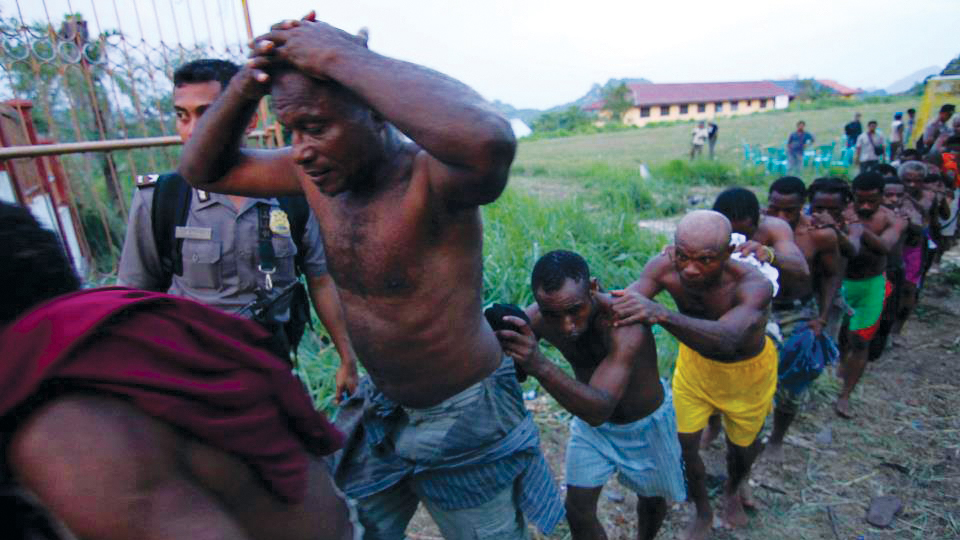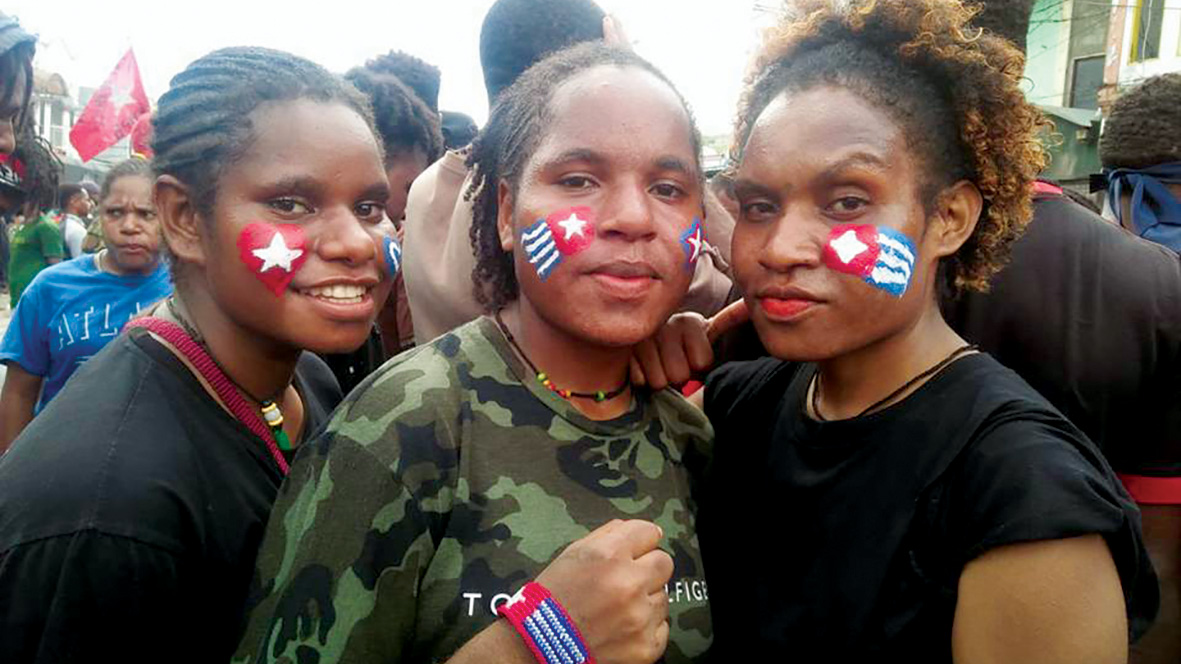
One of the most gripping missionary stories ever told is Peace Child, in which Canadian pioneer missionary Don Richardson tells how, in the 1960s, the treacherous, endlessly warring, cannibalistic Sawi tribe of Irian Jaya (formerly Dutch/West New Guinea) found new life and peace in Jesus. Similarly, the story of pioneer missionaries Philip Masters (USA) and Stanley Dale (Australia)—who were speared to death in 1968 while bringing liberty, peace, life and light to the warring tribes of Irian Jaya’s central highlands—is the stuff of legend in some church circles.
Unfortunately, while many people love a good story of danger and transformation in exotic jungle locations, not everyone cares about what happens next.
Like their Melanesian brothers and sisters throughout the Pacific, the Papuans went from being killers to choristers in a matter of decades. But, unlike most other Melanesian nations, the Papuans were denied the right to political self-determination.
In 1962, to curry favour with Indonesia during the Cold War, the West brokered the New York Agreement, which granted Indonesia the right to administer Dutch/West New Guinea. In 1969, after a rorted referendum known as the Act of Free Choice (subsequently lampooned as the Act of No Choice) Dutch/West New Guinea was officially incorporated as a province of Indonesia. For Papuans, it has been all downhill since then.
Indonesia’s Papuan provinces are rich in natural resources—including gold, silver, natural gas, copper and timber—which, unsurprisingly, Indonesia’s government and armed forces are eager to exploit. The main problems they face are inhospitable terrain (steep mountains covered in dense forest) and indigenous Papuans who, unsurprisingly object to the theft of their resources, and the subjugation and brutalisation of their people.
A low-level insurgency has simmered for decades. Since 1963, well over 100,000 Papuans have died at the hands of Indonesian security forces. Gross human rights abuses—including the torture and killing of Papuan civilians—are committed with impunity, even to this day.
Even greater than the threat of military violence is the threat posed by government-facilitated Javanese colonisation and Islamisation. In December 2003, Yale Law School’s Human Rights Clinic released a report that concluded Indonesia’s policies in Papua will, if not checked, lead to the genocide of the indigenous Papuan people.
Death toll rising
In December 2018, Papuan rebels in Papua’s Nduga Regency abducted and executed 19 Indonesian labourers who had been working on the hugely controversial Trans-Papua Highway.
Indonesian president Joko Widodo—possibly under Chinese and/or Western influence—allegedly believes the “Papua problem” can be solved by means of economic development. For Widodo, the Trans-Papua Highway is the means to that end. Papuans, on the other hand, know full well that the Trans-Papua Highway—the construction of which involves the bulldozing of pristine forests, wildlife habitats and villages for a road designed to link mines and industries to transport hubs—is being built to serve Jakarta’s interests, not theirs.
What’s more, Papuans know that, once built, the Trans-Papua Highway will serve not only to facilitate the exploitation of Papuan resources, but to further facilitate Javanese colonisation and Islamisation.
The Indonesian government’s response to the Nduga killings was swift, brutal and wildly disproportionate. Under the pretext of “hunting rebels”, the Indonesian military (TNI) rampaged through Nduga Regency, destroying homes and gardens, schools and churches, ultimately displacing more than 50,000 Papuans. Some fled deep into the jungle; most headed for the central highlands town of Wamena, where the churches provided sanctuary. Not recognised as victims of conflict, the displaced Papuans did not qualify for aid from Jakarta. For month after month the military campaign continued with no end in sight.
On August 5 last year, Canberra-based advocacy group Christian Faith and Freedom (CFF) alerted the Australian government to the unfolding humanitarian crisis in Nduga Regency. At that time, the death toll among displaced Ndugans in Wamena—from untreated illness, infected wounds (including bullet wounds and chemical burns) and starvation—was 139.
On January 21, Amnesty International’s Usman Hamid held a press conference in Jakarta to mark the one-year anniversary of the TNI deployment to Nduga Regency. Hamid criticised the Indonesian government’s deployment of troops to Nduga, lamenting in particular that the death toll amongst displaced Ndugans had risen to 263.
Despite many months of back-and-forth correspondence, CFF’s advocacy to the Australian Government has yielded nothing but frustration. A new approach has to be found.

What can we do?
In reality, the roots of the “Papua problem” lie not in poverty, but in gross human rights abuses that have their roots in Javanese Muslim racial supremacism and religious hatred of Melanesian Christians. Routinely derided as “kafir” (unbelievers) and “monkeys”, they are systematically treated as inferiors, savages and dhimmis (subjugated second-class citizens according to Islam).
No amount of infrastructure will fix this problem, especially not infrastructure the Papuans reject. To the contrary, President Widodo’s imposed “solution” is but a recipe for endless conflict, one the Papuans cannot win.

Human rights abusers will do everything in their power to keep their crimes and their victims invisible; out of sight, out of mind. The very best way to counter this is to “speak up for those who cannot speak for themselves” as the Bible instructs in Proverbs 31:8,9.
We can speak to our family, friends, neighbours and colleagues. We can raise the issue on social media, talk-back radio, in letters to the editor and in the “comments” section under articles in mainstream media. And if everyone was to write to their Federal Member of Parliament then MPs would know that voters care about this issue; something that could prove decisive when Indonesian foreign policy is discussed in the party room.
Comments and letters should be short, to the point and polite; just highlight the issue and recommend a course of action. Speak up:
- Protest the gross human rights abuses committed with impunity across the Papuan provinces
- Call for Indonesian troops to be withdrawn
- Insist that our taxpayer dollars not be used to fund controversial, destructive and highly divisive infrastructure projects in the Papuan provinces, especially not projects the Papuans reject
- Insist that our overseas aid be channelled where it is most needed: to help Papuans build and staff Papuan schools, health clinics, small businesses and other community-building and community-sustaining projects
- Call for the Papuan provinces to be opened up to the outside world for the sake of transparency, liberty and the delivery of humanitarian assistance
- Urge that consequences be forthcoming should Jakarta refuse to comply
And if you believe there is a God who loves His Creation and hears our prayers . . . then pray! Pray for the Papuans. Ask God to intervene for them. Never underestimate the power of intercessory prayer (prayer for others). For intercessory prayer to God our Father is no small thing; indeed, it is advocacy to the highest authority. Please pray.
Pressure needs to be maintained or the genocide of this betrayed and abandoned Christian people will be completed in our lifetime and on our watch.

Key Papua rights advocates

Veronica Koman. An Indonesian human rights lawyer, Koman has supported Papuan activist groups for some years, particularly the National Committee for West Papua. After she shared multiple images and details of protests and street clashes in Papua last year, she was accused by Indonesian authorities of spreading false information, prompting her to flee to Australia. Indonesia is seeking extradition.—RNZ/ABC/The Guardian

Benny Wenda. After a childhood in Papua where he witnessed brutal abuses by the Indonesian military on his family and community, Wenda became politically active as a young man. Falsely accused of participating in violent attacks he escaped from Papua and was granted asylum in the UK where he remains to this day. Wenda is a Nobel Peace Prize nominee and chairs the United Liberation Movement for West Papua. In this role he travels internationally, advocating for the cause of the Papuan people.—bennywenda.org

Nattali Rize. Heading up the roots-rock-worldbeat band Blue King Brown (founded 2003), Byron Bay’s Nattali Rize became engaged with the Papuan people’s struggle, touring with Papuan musicians, calling for their right to self-determination to be recognised from the stage and in media interviews. Now also a solo artist touring internationally with her Australian/Jamaican band, Rize continues to highlight Papua through social media, including Instagram @nattalirize.

Socratez Yoman. Church leaders of many denominations in Papua, where most indigenous people are Christians, support an end to human rights abuses and a peaceful political solution, while not taking sides on the question of independence. Reverend Socratez Yoman, the chair of the Communion of Baptist Churches in Papua, however, is strongly and publicly pro-independence. “I cannot choose silence. I have an obligation to stand with my sheep,” he is quoted as saying. Yoman voices his concerns from the pulpit, in the mass media, through authoring books and in meetings with political leaders.—ucanews.com
Elizabeth Kendal is an international religious liberty analyst, advocate and author. She serves as director of advocacy at Christian Faith and Freedom in Canberra and as an adjunct research fellow at the Arthur Jeffery Centre for the Study of Islam at the Melbourne School of Theology. For more detail on abuses in Papua and what you can do to help, visit <ElizabethKendal.com>.









